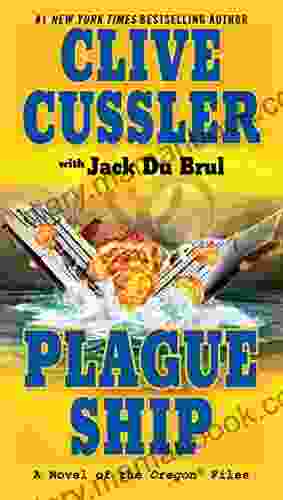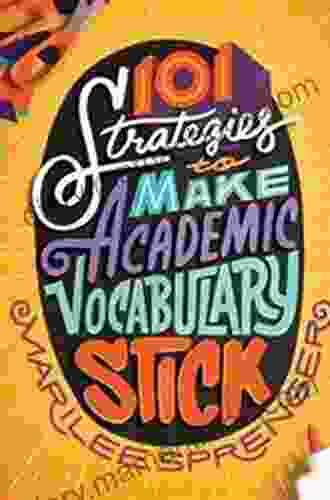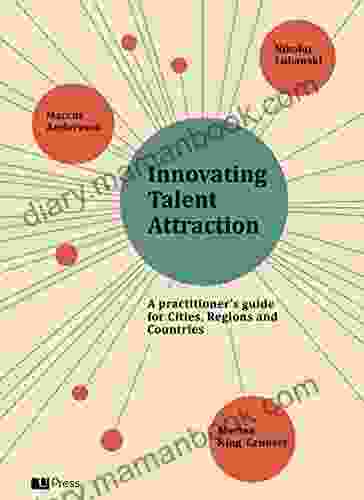101 Strategies to Make Academic Vocabulary Stick: A Comprehensive Guide to Effective Vocab Instruction

Academic vocabulary is an important part of student success. It is the language that students need to know in order to understand and participate in academic discussions, read and write academic texts, and solve academic problems. However, many students struggle to learn and remember academic vocabulary. This article provides 101 strategies that teachers can use to help their students master academic vocabulary. These strategies are organized into six categories: providing multiple exposures, making vocabulary meaningful, using games and activities, using technology, providing feedback, and assessing student learning.
4.5 out of 5
| Language | : | English |
| File size | : | 2059 KB |
| Text-to-Speech | : | Enabled |
| Screen Reader | : | Supported |
| Enhanced typesetting | : | Enabled |
| Word Wise | : | Enabled |
| Print length | : | 106 pages |
Providing Multiple Exposures
- Use vocabulary words in multiple contexts. Don't just define the word once and be done with it. Use the word in different sentences, paragraphs, and even stories. The more students see the word, the more likely they are to remember it.
- Expose students to vocabulary words in different ways. Don't just read the words aloud. Write them on the board, use them in games, and have students create their own sentences or drawings with them.
- Provide students with repeated opportunities to practice using vocabulary words. Don't just test students on the words once. Give them multiple opportunities to practice using the words in different ways.
Making Vocabulary Meaningful
- Connect vocabulary words to students' prior knowledge. Help students understand how new vocabulary words relate to words they already know.
- Use real-world examples to illustrate the meaning of vocabulary words. Show students how the words are used in everyday life.
- Have students create their own definitions for vocabulary words. This helps them to understand the meaning of the words in a deeper way.
- Have students use vocabulary words in their own writing and speaking. This helps them to internalize the meaning of the words.
Using Games and Activities
- Play vocabulary games. There are many different vocabulary games available, such as Bingo, Memory, and Charades.
- Use vocabulary activities in your lessons. For example, you could have students create vocabulary maps, write vocabulary poems, or act out vocabulary scenes.
- Incorporate vocabulary into your classroom routines. For example, you could have students greet each other with a vocabulary word or use vocabulary words in your morning announcements.
Using Technology
- Use online vocabulary games and activities. There are many different online vocabulary games and activities available, such as Quizlet, Vocabulary.com, and WordHippo.
- Use technology to create your own vocabulary games and activities. For example, you could create a PowerPoint presentation with vocabulary words and definitions, or you could create a website with vocabulary games.
- Use technology to help students track their progress. For example, you could use a spreadsheet to track students' scores on vocabulary quizzes.
Providing Feedback
- Give students feedback on their vocabulary usage. Let them know when they use vocabulary words correctly, and help them to correct their mistakes.
- Provide students with opportunities to self-assess their vocabulary knowledge. For example, you could have them complete a vocabulary self-assessment checklist.
- Use data to inform your vocabulary instruction. Track students' progress on vocabulary quizzes and activities, and use this data to identify areas where students need more support.
Assessing Student Learning
- Use a variety of assessment methods to measure students' vocabulary knowledge. This could include quizzes, tests, essays, and oral presentations.
- Use informal assessment techniques to monitor students' progress. This could include asking students to define vocabulary words, use vocabulary words in sentences, or identify vocabulary words in context.
- Use data to inform your vocabulary instruction. Track students' progress on vocabulary assessments, and use this data to identify areas where students need more support.
Learning academic vocabulary is essential for student success. By using a variety of strategies, teachers can help their students to master academic vocabulary and achieve their academic goals.
4.5 out of 5
| Language | : | English |
| File size | : | 2059 KB |
| Text-to-Speech | : | Enabled |
| Screen Reader | : | Supported |
| Enhanced typesetting | : | Enabled |
| Word Wise | : | Enabled |
| Print length | : | 106 pages |
Do you want to contribute by writing guest posts on this blog?
Please contact us and send us a resume of previous articles that you have written.
 Top Book
Top Book Novel
Novel Fiction
Fiction Nonfiction
Nonfiction Literature
Literature Paperback
Paperback Hardcover
Hardcover E-book
E-book Audiobook
Audiobook Bestseller
Bestseller Classic
Classic Mystery
Mystery Thriller
Thriller Romance
Romance Fantasy
Fantasy Science Fiction
Science Fiction Biography
Biography Memoir
Memoir Autobiography
Autobiography Poetry
Poetry Drama
Drama Historical Fiction
Historical Fiction Self-help
Self-help Young Adult
Young Adult Childrens Books
Childrens Books Graphic Novel
Graphic Novel Anthology
Anthology Series
Series Encyclopedia
Encyclopedia Reference
Reference Guidebook
Guidebook Textbook
Textbook Workbook
Workbook Journal
Journal Diary
Diary Manuscript
Manuscript Folio
Folio Pulp Fiction
Pulp Fiction Short Stories
Short Stories Fairy Tales
Fairy Tales Fables
Fables Mythology
Mythology Philosophy
Philosophy Religion
Religion Spirituality
Spirituality Essays
Essays Critique
Critique Commentary
Commentary Glossary
Glossary Bibliography
Bibliography Index
Index Table of Contents
Table of Contents Preface
Preface Introduction
Introduction Foreword
Foreword Afterword
Afterword Appendices
Appendices Annotations
Annotations Footnotes
Footnotes Epilogue
Epilogue Prologue
Prologue Herbert Schildt
Herbert Schildt T M Bilderback
T M Bilderback Bing Xin
Bing Xin Marilee Sprenger
Marilee Sprenger Colleen Francis
Colleen Francis Kj Kalis
Kj Kalis L Renee Whaley
L Renee Whaley Amanda Gail Click
Amanda Gail Click Sk Mishra
Sk Mishra Jason Cheek
Jason Cheek Shlomi Harif
Shlomi Harif Hourly History
Hourly History Aldous Carroll
Aldous Carroll David Hingley
David Hingley Richard D Wolff
Richard D Wolff Shanna Bell
Shanna Bell Kate Raworth
Kate Raworth Kareem Abdul Jabbar
Kareem Abdul Jabbar Katherine Center
Katherine Center Mary M Dalton
Mary M Dalton
Light bulbAdvertise smarter! Our strategic ad space ensures maximum exposure. Reserve your spot today!

 Elton HayesDelving into the Heartfelt Reunion of Team Asuma: A Narrative Exploration of...
Elton HayesDelving into the Heartfelt Reunion of Team Asuma: A Narrative Exploration of...
 Harrison BlairLitecoin Scrypt Mining Configurations For Radeon 7950: A Comprehensive Guide...
Harrison BlairLitecoin Scrypt Mining Configurations For Radeon 7950: A Comprehensive Guide... Cade SimmonsFollow ·14.2k
Cade SimmonsFollow ·14.2k Jared PowellFollow ·19.9k
Jared PowellFollow ·19.9k Wade CoxFollow ·14.4k
Wade CoxFollow ·14.4k Darrell PowellFollow ·5.9k
Darrell PowellFollow ·5.9k Sammy PowellFollow ·7.3k
Sammy PowellFollow ·7.3k George MartinFollow ·14.6k
George MartinFollow ·14.6k Josh CarterFollow ·13.8k
Josh CarterFollow ·13.8k Jonathan FranzenFollow ·5.8k
Jonathan FranzenFollow ·5.8k

 Jorge Luis Borges
Jorge Luis BorgesThe Truth About the 15 Qualities That Men Secretly Admire...
Every woman wants to be loved and...

 Francisco Cox
Francisco CoxPlague Ship: Unraveling the Mystery of the Oregon Files
The Oregon Files, a collection of classified...

 Rudyard Kipling
Rudyard Kipling101 Strategies to Make Academic Vocabulary Stick: A...
Academic vocabulary is an...

 Fletcher Mitchell
Fletcher MitchellPractitioner Guide for Cities, Regions, and Countries:...
The world is...

 Emilio Cox
Emilio CoxOptimization and Security Challenges in Smart Power Grids
Smart power grids (SPGs) are emerging as a...

 Chandler Ward
Chandler WardMiles Davis and the Civil Rights Movement in America: A...
Miles Davis, the iconic jazz...
4.5 out of 5
| Language | : | English |
| File size | : | 2059 KB |
| Text-to-Speech | : | Enabled |
| Screen Reader | : | Supported |
| Enhanced typesetting | : | Enabled |
| Word Wise | : | Enabled |
| Print length | : | 106 pages |







